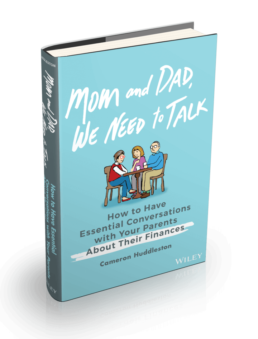If there’s one thing I think no adult should be without, it’s a power of attorney.
You were probably thinking I was going to say something more essential to a happy life – such as love and affection or a sense of purpose. Of course those things are important, but I’m a financial journalist and this is a blog about money (mostly). So that’s why I want to highlight how essential having a power of attorney is for everyone.
Unfortunately, most Americans don’t have this legal document. Only one-third of adults 55 and older have a durable power of attorney, according to a survey by Merrill Lynch and Age Wave. The percentage among younger generations is likely even lower.
If so many Americans don’t have a power of attorney, it can’t be that necessary, right? Wrong. If you want to have a say in who gets to make financial decisions for you if you can’t on your own, you need a power of attorney.
The ABCs of POA
A power of attorney is a legal document that allows you to name someone to make financial and legal decisions for you if you can’t. You might need someone to make financial decisions for you if an injury or other health emergency leaves you temporarily unable to make decisions on your own. You might need someone to manage your finances for you if you develop dementia. Or you might simply need someone to make a one-time financial transaction for you if you’re overseas and can’t access your accounts.
In short, there are a variety of situations when you might have to rely on someone else to handle your finances for you. You want that to be someone you trust and have chosen to take on the responsibility. Otherwise, if something happens to you, the person who steps into this role – or is appointed by a court — might not be the person you would want handling your finances (more on this below).
Actually, you can name more than one person to act on your behalf as your power of attorney. This can be a good idea so you’ll have a backup in case one POA is unable to take on the responsibility at any given point and so you’re not putting so much power into just one person’s hands. Even if you’re married, you still need to have a power of attorney (you can name your spouse) because there are limits on the authority your spouse has over property you own together.
Types of POA
There are four main types of power of attorney. The one you choose will determine how much power you actually give the person you choose to be your agent.
Limited POA: A limited power of attorney gives someone the right to make only certain financial decisions for you or one-time transactions. For example, you might have a limited POA to close a real estate deal for you.
General POA: A general power of attorney gives someone broad powers – essentially the right to make any sort of financial decision if you are temporarily unable to do so yourself. It’s no longer valid if you become incapacitated or when you die.
Durable POA: A durable power of attorney can be general or limited. However, it remains in effect when you become incapacitated. For example, if you develop dementia, you would need to have a durable power of attorney to make financial decisions for you.
Springing POA: This type of power of attorney springs into effect under certain circumstances that you designate. For example, you might have a springing POA that becomes valid once you become mentally incapacitated and are designated as such by one or more physicians.
Elder law attorney Josh Berkley recommends having a general durable power of attorney – the kitchen sink power of attorney, as he calls it. “It gives someone the power to do anything,” he said. “It’s about as broad as can be.”
A limited power of attorney can be too restrictive – and, therefore, ineffective if you truly need someone to step in and take over your finances if you become incapacitated. “I don’t normally recommend that because you don’t always know what will come up,” he said. “You need people to have broad powers.”
The problem with a springing power of attorney is that your agent might not be able to act on your behalf until he or she has gotten in writing from doctors or jumping through other hoops to prove you’re no longer competent. Even more troublesome is defining in a springing POA document at what point you are incapacitated. The triggers that make your power of attorney springing could be subject to argument in court, Berkley said.
The Power of Power of Attorney
The idea of giving someone so much power over your finances with a general durable power of attorney probably seems risky. It can be if you don’t name the right the person. That’s why it’s so important to choose someone you trust to be your power of attorney.
If you want to make sure that person only uses that power once you’re no longer able to make financial decisions on your own, put the POA document some place safe and spell out under what conditions you’re comfortable with that person accessing the document. You see, your power of attorney will need to show the actual document to your financial institutions before getting access to any of your accounts. Without the document, your POA doesn’t really have any power.
It’s smart to review and update your power of attorney document every three to five years, Berkely said. If you draft one and stick it in a lockbox for more than a decade, there’s a risk that your financial institutions won’t accept it because they’ll consider it outdated. The document will still be valid, but some companies have policies that require POA documents to no more than a few years old, he said.
Also be aware that you can revoke a power of attorney. In other words, you can take the power away from one person and give it to someone else.
What Could Happen If You Don’t Have a POA
I can’t overstate the importance of drafting a power of attorney document as soon as possible. That’s because you must be mentally competent to sign this document. If you have a stroke, develop dementia or have some other emergency that makes you mentally incompetent, it’s too late for a power of attorney to be drafted and signed.
In that case, someone will have to go to court to be legally appointed to make financial decisions for you. There are two big problems with this. For starters, that person might not be the one you would’ve chosen for this role. Even if the person is someone you’re comfortable with assuming this role, that person – likely a loved one – will have to spend a lot of time and money going through the court process to become your conservator. In my Mom and Dad, We Need to Talk: How to Have Essential Conversations With Your Parents About Their Finances, I shared the story of Doug Nordman. His father hadn’t named a power of attorney before developing Alzheimer’s disease, so Doug had to spend more than $10,000 and nine months going through the legal process to become his dad’s conservator. It was the only way at that point he could get the legal authority to manage his father’s finances for him.
Not only is this process expensive, but also it can be emotionally taxing. Your loved ones will basically be putting you on trial to prove you’re no longer competent enough to make financial decisions for yourself. I don’t you – or anyone – would want that.
Meet with an estate planning or elder law attorney to draft a power of attorney document – as well as a will or living trust and an advance health care directive. The cost of these estate planning documents can be up to $1,000 – or more, depending on the complexity of your situation.
There are lower-cost POA and other legal forms available on websites such as Nolo.com, LegalZoom and Rocket Lawyer. Having legal documents drafted by an attorney to conform to your state’s laws and to be tailored to your situation are ideal. But if paying an attorney doesn’t fit within your budget, getting fill-in-the-blank legal documents are betting than nothing, estate planning attorneys have told me.
To find an estate planning or elder law attorney, start by asking friends and family for recommendations. You also can use the following resources:
- Avvo: This free database allows you to search for attorneys by practice area or name and state.
- National Academy of Elder Law Attorneys: This is an association of attorneys who specialize in elder law and special needs planning. It has a searchable directory.
- National Association of Estate Planners and Council: This is an association of financial and legal professionals who are Accredited Estate Planners and Estate Planning Law Specialists. It has a searchable database of members.
Note: Not only is important for you to have a power of attorney, but you should also make sure your parents have this essential legal document. If something were to happen them and they hadn’t named you, your siblings or anyone else to make financial decisions for them, you could end up in court as Doug Nordman did.
If you’re not sure whether you want to step up and volunteer to be your parents’ POA, listen to my interview with Chris Browning on his Popcorn Finance podcast to hear what being a power of attorney can entail.
Don't Miss Out! ORDER NOW!
"An excellent step-by-step guide to navigate what can be time-consuming, uncomfortable conversations."
- Michelle Singletary, The Washington Post
Related Posts
May 7, 2025
How to Talk to Your Parents About Their Stuff You Don’t Want
These tactics might get your parents to…

Cameron Huddleston
I am the author of Mom and Dad, We Need to Talk: How to Have Essential Conversations With Your Parents About Their Finances. I also am an award-winning journalist with 20 years of experience writing about personal finance. My work has appeared in Kiplinger’s Personal Finance, Forbes.com, Yahoo!, MSN, and other online and print publications.




